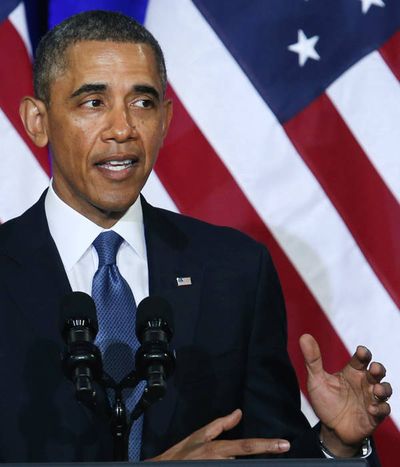President Obama Is Getting Serious About Stopping Rape on College Campuses
How President Obama is stepping in to protect you on your college campus.


No one in America is more at risk of being raped or assaulted than college women. So says a new report from the White House Council on Women and Girls titled "Rape and Sexual Assault: A Renewed Call to Action."
Accompanying the report is a presidential memorandum, expected to be signed by President Obama today, that will create a task force to combat sexual assault, particularly on college campuses. According to the Associated Press, the president will give the task force 90 days to come up with a list of recommendations for colleges to prevent and respond to sexual assault, increase public awareness of each school's track record and enhance coordination between federal agencies to hold institutions accountable if they don't confront the problem. "The president is committed to solving this problem, not just as president of the United States, but as a father of two girls," Valerie Jarrett, chair of the Council on Women and Girls, told the AP.
The report details the gravity of the problem, noting that nearly 22 million American women and 1.6 million men have been raped in their lifetimes. But as Marie Claire reported in its November story "Big Shame on Campus," college women are disproportionately affected. One in five college women will be the victim of an attempted or completed sexual assault during her four years of school, as opposed to 1 in 6 of all American women.
Despite the alarming statistics about the prevalence of rape on college campuses, investigations by college administrators and campus police are often lackluster or non-existent and college women nationwide say they're being contradicted, discouraged, ignored, and even blamed when they come forward to report a sexual assault. "It's too easy for sexual violence to exist in the shadows and behind closed doors," John DiPaolo, deputy assistant secretary for policy at the Department of Education's Office of Civil Rights (OCR), told me at the time. "It's really unique and extraordinary in a terrible way that there's that level of sexual violence going on in places where otherwise things are relatively safe. What if that were the case with general assault or robberies at gunpoint? It would just be unthinkable."
The last time the Obama Administration attempted to prompt college administrators to take rape and sexual assault more seriously was in April 2011 when OCR sent a 19-page "Dear Colleagues" letter to more clearly spell out what is expected of them. The letter directed universities to resolve cases promptly, to use the "preponderance of evidence" standard of proof (i.e., if it's more likely than not that an assault occurred, the school must respond), and reminded schools of their obligation under the law to protect the victim during the investigation.
Reminding colleges of their legal obligations was an important step, but as we've seen all too often in the past year as colleges—from big state schools like the University of North Carolina to small liberal arts schools like Swarthmore—were hit with allegations from students who said administrators and campus police officers in one way or another horribly mishandled their sexual assault cases, writing down what should happen doesn't mean it's actually happening. Which is why President Obama's task force is encouraging: what we're doing now isn't enough to stop the violence against women at our nation's colleges, so let's get some smart, powerful people in a room and figure out what more can be done. College women are waiting.
Read "Big Shame on Campus" here.
Get exclusive access to fashion and beauty trends, hot-off-the-press celebrity news, and more.
Kayla Webley Adler is the Deputy Editor of ELLE magazine. She edits cover stories, profiles, and narrative features on politics, culture, crime, and social trends. Previously, she worked as the Features Director at Marie Claire magazine and as a Staff Writer at TIME magazine.
